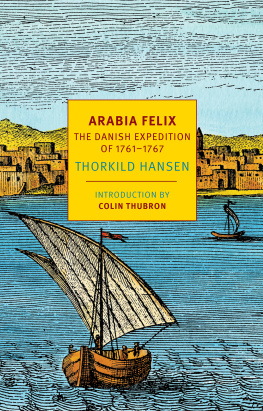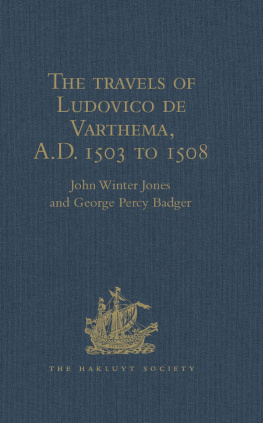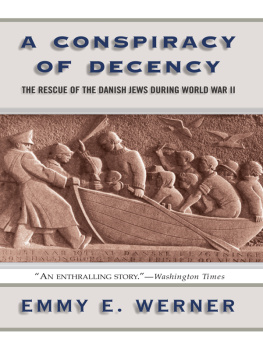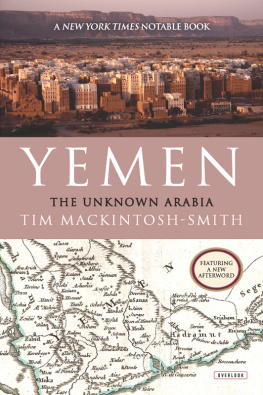
THORKILD HANSEN (19271989) was born in Ordrup, Denmark, and studied literature at the University of Copenhagen for two years before moving to Paris in 1947. In France, Hansen supported himself by writing dispatches for the Copenhagen-based tabloid Ekstra Bladet. He returned to Denmark in 1952 and published his first full-length novel, Resten er Stilhed (The Rest Is Silence) in 1953. Hansen would go on to write more than two dozen books, many of which drew on the historical record to interrogate Denmarks record of imperialism, including Pausesignaler (Pause Signals, 1959); Jens Munk (1965), which won the Golden Laurel Award; a trilogy about the Danish slave trade (19671970), the final volume of which won the Nordic Council Prize; and Processen mod Hamsun (The Case Against Hamsun, 1978). He died aboard a cruise ship in the Caribbean in 1989.
JAMES M c FARLANE (19201999) studied modern languages at Oxford and was the first dean of the school of European studies at the University of East Anglia. Britains preeminent Ibsen scholar, he edited the eight-volume The Oxford Ibsen, translating a number of the books himself. He and Kathleen Crouch were married in 1944.
KATHLEEN M c FARLANE (19222008) was a translator and a celebrated weaver and artist from Sunderland. One of her fabric sculptures hung in Norwich Castle for thirty years.
COLIN THUBRON is the president of the Royal Society of Literature. Among his books are The Lost Heart of Asia, Shadow of the Silk Road, and most recently, Night of Fire. He is also, with Artemis Cooper, the co-editor of The Broken Road, the final volume of Patrick Leigh Fermors Walking Trilogy.
ARABIA FELIX
The Danish Expedition of 17611767
THORKILD HANSEN
Translated from the Danish by
JAMES McFARLANE and
KATHLEEN McFARLANE
Introduction by
COLIN THUBRON
NEW YORK REVIEW BOOKS

New York
Note: In this translation of Det Lykkelige Arabien certain passages and references of purely Danish interest have been omitted.
THIS IS A NEW YORK REVIEW BOOK
PUBLISHED BY THE NEW YORK REVIEW OF BOOKS
435 Hudson Street, New York, NY 10014
www.nyrb.com
Copyright 1962 by Thorkild Hansen & Gyldendal, Copenhagen
Translation copyright 1964 by Wm. Collins Sons & Co., Ltd
Introduction copyright 2017 by Colin Thubron
All rights reserved.
Cover image: Georg Wilhelm Bauernfeind, view of Jeddah, in present-day Saudi Arabia, c. 1762; color by Lucas Adams
Cover design: Katy Homans
Published by arrangement with Gyldendal Group Agency.
Library of Congress Cataloging-in-Publication Data
Names: Hansen, Thorkild, 1927-1989, author.
Title: Arabia Felix : the Danish expedition, 1761-1767 / by Thorkild Hansen ; introduction by Colin Thubron ; translated by James McFarlane and Kathleen McFarlane.
Other titles: Lykkelige Arabien. English
Description: New York : New York Review Books, 2017. | Series: New York Review Books classics | Originally published: New York : Harper & Row, 1964.
Identifiers: LCCN 2016059783| ISBN 9781681370729 (paperback : alkaline paper) | ISBN 9781681370736 (ePub)
Subjects: LCSH: Niebuhr, Carsten, 17331815TravelArabian Peninsula. | Niebuhr, Carsten, 17331815TravelYemen (Republic) | Arabian PeninsulaDescription and travel. | Yemen (Republic)Description and travel. | DanesTravelArabian PeninsulaHistory18th century. | DanesTravelYemen (Republic)History18th century. | Scientific expeditionsArabian PeninsulaHistory18th century. | Scientific expeditionsYemen (Republic)History18th century. | BISAC: HISTORY / Expeditions & Discoveries. | HISTORY / Europe / Scandinavia.
Classification: LCC DS206 .H313 2017 | DDC 939.4/9dc23
LC record available at https://lccn.loc.gov/2016059783
ISBN 978-1-68137-073-6
v1.0
For a complete list of titles, visit www.nyrb.com or write to:
Catalog Requests, NYRB, 435 Hudson Street, New York, NY 10014
CONTENTS
INTRODUCTION
During the Age of Enlightenment, in an eighteenth century filled with colonial conquest, a surge of parallel expeditions was undertaken in search of scientific knowledge. A later age has sometimes impugned these ventures, but the specimens they accumulated, and the records they left behind, are often the fruits of disinterested passion and long hardship. Their participants ranged from the obsessively curious to the lively amateur and the dull careerist, and their results were similarly uneven: magnificent, surprising, or erroneous.
One of the first such ventures was a tragically ambitious voyage destined for Arabia, and it originated not in imperial Britain or France but in the small kingdom of Denmark. Its motives were mixed. It was charged both with scientific investigation and cartography and with the discovery of such fabled phenomena as the inscriptions left by the Israelites as they fled out of Egypt and the tidal fluctuations of the Red Sea. The success of the venture, of course, would redound above all to the glory of Denmark and of Frederick V, its patron-king.
From the moment of the expeditions departure in January 1761 the governments and universities of Europe followed its progress with fascination, but as the years went by and its intermittent dispatches dwindled, the interest of its sponsors turned to foreboding, and they at last became inured to a fateful silence. By the voyages end in 1767, when its only survivor stumbled home, the venture was all but forgotten. Frederick V was dead. His teenage heir was more interested in prostitutes than in culture, and the expeditions depleted but important findings, when they at last reached Denmark, were stacked up to rot in lumber rooms.
The groundbreaking account of this extraordinary journey, published in Danish as Det lykkelige Arabien in 1962, was the work of a writer obsessed by travel and exploration. Thorkild Hansen, who died in the Caribbean at the age of sixty-two, became noted in his country for a trilogy of books on Denmarks complicity in the West Indian slave trade. His working method combined the diligent examination of original documents with a discreet imaginative license in re-creating the episodes they recorded.
In researching his book on the Danish expedition to Arabiaa venture then little known even in his own countryhe delved into the Danish State Archives to read the letters, reports, and even financial accounts of the journeys members, and created from them and from published diaries a near-scholarly work, with a novelists feel for pace and character. His vivid account, Arabia Felix, was published in English in 1964 in the lucid translation of James and Kathleen McFarlane. It was only then that the full drama and strangeness of the expedition was widely revealed.
Its destination was Arabia Felixtodays Yementhe legendary country of spices, myrrh, and frankincense of which contemporary Europe knew almost nothing. And it was in the malarial obscurity of this so-called Happy Arabia that one by one the explorers began to perish.
From the start they met fluctuating fortunes. The man-o-war in which they sailed from Copenhagen was driven northwards before a ferocious gale almost to Iceland. Then the Mediterranean brought respite as they sailed east with gentle southerly winds. Their warship outfaced hostile British privateers before arriving at Tenedos off the coast of Asia Minor, where an over-rigged Turkish ship carried the travelers with painful slowness to Constantinople, and from there they made their way at last to Alexandria.
Next page









